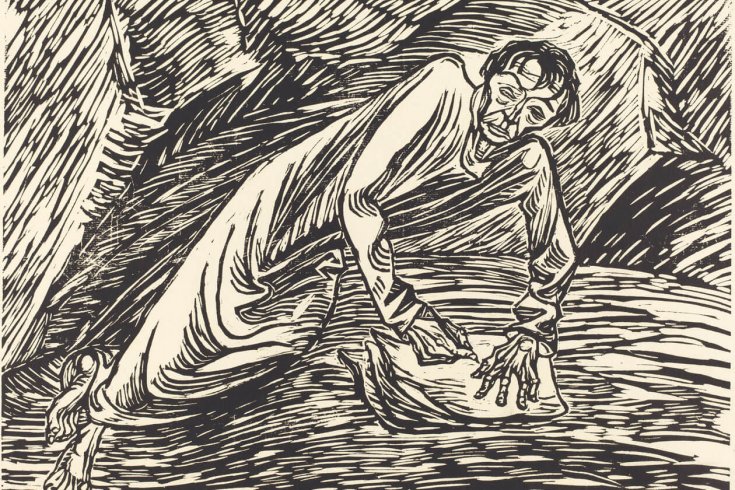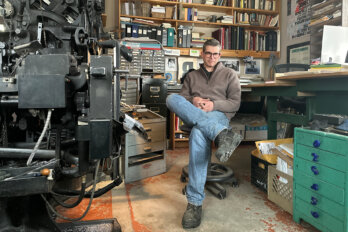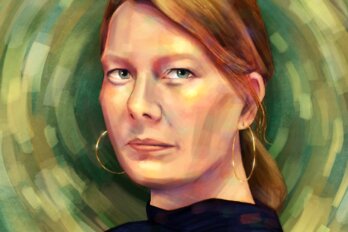The first, and I think only, poetry reading I ever went to with my father was at a bookshop next to Washington Square Park in Manhattan. It was afternoon, and there were two poets reading. I remember at lunch we had eaten and drunk to our satisfaction and beyond, so as soon as the first poet began, my father almost immediately fell asleep in his chair, leaning back his head, quietly snoring. I didn’t wake him.
The second poet began. His voice was much quieter than the first, and the whole room seemed to focus down into it. My father’s eyes opened, his head snapped a bit alarmingly forward, and he stared at the poet the entire time while he read.
Afterward my father came up to me among the shelves and said, I loved that, even though I didn’t understand it. He repeated that sentence over and over, confused and distressed. I didn’t know what to say. A part of me wishes I had found a way just to ask him what the poems made him think of, what they brought up in his mind. I would have loved to hear it; it would have been such a different way of getting to know my father, impossible now.
In the end, though, I know it was good for this experience to remain private. It could never have been truly translated or explained. To emerge from sleep, to hear the poems and follow and join them with a gradually waking mind, to understand them and even love them in a way that comes from language, but is beyond the ability of language to describe . . . this may very well have been a nearly perfect experience to have with poetry, especially for someone inclined to be skeptical of it. Despite its ordinary resistance to poetry, my father’s sleepy, drifting attention slipped easily into the associating movement of the mind of that second reader, the great Slovenian poet Tomaž Šalamun, and then continued in its own private directions.
My father and I had always had difficulty understanding each other. Naturally I loved him, and naturally too I fought with him. I was his eldest son, and there was something archetypal about our battles.
This was especially true about my choice to become a poet. During his life, we were never really able to connect around poetry. Before he died, I had already started to think about writing this book, but never got a chance to talk with him about it.
It pains me for many reasons that we were never able to find a way to talk about poetry, especially because, as it turns out, poets and lawyers have a similar relation to language. My dad was a tax lawyer. This profession is much less boring than it sounds, which is (as my father often said) very. One idea I really wish I could have run by him is that there is something unexpectedly akin in our mutual fascination with the exact meanings of words, and where the limits to those meanings reside.
Lawyers who specialize in taxation are deeply involved in the intricate problems of contracts and legislation. They try, through language, to define what is and is not legal or statutory behaviour, either before or after the fact. For lawyers like my father, writing a good contract or law is really about sharply defining the limits of words. When I was a kid, listening to my father talk with his colleagues, or visiting him at the office, I heard so many conversations around definitions. Ordinary words—“gift,” “buy,” “take,” “allow,” as well as more complex, Latinate ones—became the exciting subjects of much attention, and seemed to reveal great power and meaning, and also potential danger.
Poets of course are also fascinated with these very same borders, the limits of words. How far can a word be pushed and still mean? Yet not just poets but lawyers too can desire the expansion of the limits of the word, in the interests of permission. I know for my father it could become a deeply satisfying intellectual project, like a serious game, to reimagine the meaning of a phrase, a clause, even a word, to see that it could mean something in a different way, and thus achieve a different result.
And, likewise, poets need in their poems not only to expand but also to define words quite precisely in their contexts, in order to avoid meaningless ambiguity. Poets and lawyers both are deeply concerned with what lies at the limits of language, and the fearful and intensely attractive nothingness beyond.
I have found that the poems which have meant the most to me, to which I return again and again, retain a central unsayability, a place where the drama of truly looking for something essential that can never quite be reached is expressed. Somewhere in the poem, or at its end, knowingness stops. You can feel the intelligence in the poem truly exploring, clambering along the words and down the page, and also that intelligence stopping at what cannot be known. Those moments where a limit is reached can often be the greatest, and most honest, in poetry. They can come first as a surprise, then immediately afterward feel inevitable, at least for a little while.
Once in a lecture I heard the poet Ralph Angel say, “Poetry has always existed and always will exist, because there will always be the need to say that which cannot be said.” “The lyric,” writes Fanny Howe in her essay “Bewilderment,” “is a method of searching for something that cannot be found.” Poetry, by nature, brings us up to the limit of what we can know, and in great part, this is why it exists and continues to be written.
This is why asking for a certain kind of knowledge—that way of knowing we automatically, and justifiably, expect from other texts, anything other than a poem—limits our experience with poetry. If we imagine a poem as something to be answered or solved, we will most likely find ways to do so. But I think we would be better off to think of “understanding” in a poem as an ongoing process of attention.
Simone Weil writes that attention is the purest form of generosity. A generous, open, genuinely focused attention moves us through the poem, just as it moves us through an experience, through a friendship, through anything else that means and keeps on meaning. If a poem is really good, you can’t really say what it’s “about,” that is, what its central “message” is, any more than you can do so for a painting or a piece of music or a person or a mountain.
In response to a question after a lecture at New York University about how to understand poetry and what it means, the poet Joshua Beckman said the following: “If you imagine the poem is a question to be answered, once you’ve answered the question, you move on.” The quality of a great poem might very well be not only the impossibility, but the undesirability, of feeling as if it can ever be completely “understood,” that the experience of reading the poem could ever be finished.
A poem is like a person. The more you know someone, the more you realize there is always something more to know and understand. A final understanding could probably only begin upon permanent separation, or death. This is why we come back to certain poems, as we do to places or people, to experience and re-experience, to see ourselves for who we truly are, and to continue to be changed.
One thing has never changed for me about writing poetry: I always feel a fear and excitement at the nothingness when I begin. Faced with the emptiness of the page, it can be hard to break the silence, to start saying anything at all. Always in the beginning I have the almost overwhelming feeling that life is too great and too full, too terrifying and too sublime. How could a little poem ever measure up? What will it do that living itself cannot?
But, ultimately, the desire to make something wins out. I begin with very small scratchings, phrases, bits and pieces of something I can’t yet grasp. There is mostly nothing there at the beginning, and I am just trying to make something happen. Maybe just an impulse, or the extremely unformed desire to speak. I try to find the poem by following the language that emerges from somewhere, maybe a personal or collective unconscious, and thinking very hard for a long time about what those words might suggest. There is only the blank page or silence, and the simple desire to speak, to say something that matters.
It is the silence itself that draws me into speaking. I feel a silence around each word, a necessary absence that I want to maintain, because I feel to drown out that silence fully, to block it, would be to forget or ignore something I cannot about the reality of our existence. This is, I am sure, why I am a poet, and not a storyteller. For me the silence, that nothingness, always needs to be there.
More than any other use of language, poetry speaks, while also pointing to and reminding us of nothingness. There is an obvious absence at the end of the line, whenever it stops short of the right margin. And look at how the title of a poem just floats up there, all alone and ridiculous and forlorn, with white space above and below it. More often than not it’s not connected to anything, and there’s no structure to support it.
In a poem, we feel what is there, but also what is not. What is not there is brought so close to us that it makes us all the more alive. This is something akin to (but far darker and more dangerous than) the beautiful insufficiency of prayer, the pleasurable ache of being brought as close as possible to the divine, and always falling short.
Poems are, as Federico García Lorca writes, “drawn to the edge of things,” and the greatest edge is, of course, our mortality. This edge of things for Lorca was the line between life and death, what he calls the duende. The reason we can find the most powerful energy of duende in poetry, even more powerful than in more dramatic forms of art like dance or theatre or music, is because of the palpable silence that surrounds a poem.
The silence at the end of a broken line is one of many characteristic visual and aural reminders of the presence of silence. There are the space and silence that surround the title of a poem. The way the title comes out of nowhere, and often doesn’t immediately suggest what is coming next, can remind us of how weird language is, and how close to meaninglessness we always are. This effect of the title surrounded by white silence is exacerbated by the leap to the first line of the poem, which again, more often than not, is more obscure and elusive than in other forms of writing.
The form of the poem—its pervasive white spaces, refusals or withdrawals at the ends of lines and between the stanzas—reminds us of nothingness. There is silence too in the leaps of metaphor and symbol and rhyme and association that remind us of gaps in thought, all the ways poetry sometimes behaves like all other forms of writing but can at any moment say “no” to all the usual functions of language, its association and movement as a form of content, the way it refuses to do what it is supposed to do.
Wittgenstein wrote that what we cannot speak about must be passed over in silence. Or maybe what we cannot speak about can only be conjured in poetry through the mechanism of negation, saying no. This existential negation is only possible when one chooses to write poetry: saying no to all other purposes, to bring us up as close as possible to silence, absence, nothingness, so that we can start to feel what it means to live our lives so close to the abyss. It is, paradoxically, only when we truly start to feel that nothingness, that absence, that the meaning particular to poetry can emerge.
In the middle of a 1939 elegy for the death of W. B. Yeats, Auden writes emblematically about nothingness and poetry:
You were silly like us; your gift survived it all:
The parish of rich women, physical decay,
Yourself. Mad Ireland hurt you into poetry.
Now Ireland has her madness and her weather still,
For poetry makes nothing happen: it survives
In the valley of its making where executives
Would never want to tamper, flows on south
From ranches of isolation and the busy griefs,
Raw towns that we believe and die in; it survives,
A way of happening, a mouth.
As so often happens in poetry, a single phrase—poetry makes nothing happen—has been isolated from its context. Depending on your mood, this can be taken to mean that poetry does nothing, a statement of frustration, or maybe a reflection in the poem of the pervasive attitude of executives and revolutionaries that poetry might be more or less nice or cultured, but what is it “for,” what does it “do,” how does it participate in the great necessities?
But grammatically, in its context, this can also be seen as a statement of what poetry does: poetry makes nothing happen, that is appear and do and be. The brilliance of this phrase when it is read in the context of the poem is that it simultaneously says and enacts. What it means is what it does. Nothing, a mostly dormant idea that we probably don’t think much about (and if so pejoratively), starts to happen for us in the poem; that is, become something that we can imagine, think, and wonder about. The “nothing” that poetry makes happen can only happen if the whole poem is considered, and if the movement of the mind from one idea to the next, and so on, is traced and pondered.
In addition to being an elegy for a particular person, the poem is also a reflection of the mood on the eve of World War II. Because “poetry makes nothing happen” it “survives / In the valley of its making.” This valley where poetry survives exists because it is made by poetry itself. Perhaps it is retrospective, knowing now what was to come so soon after 1939, but I can’t help but hear in these lines a flicker of a fantasy that there would be a valley where something could survive, untouched, whatever calamities were to come.
Not too long ago, I was going through some old e-mails, looking for ones that mentioned Tomaž Šalamun, the poet who had so troubled my father at that reading. Tomaž had recently died of lung cancer. My friends and I revered and adored Tomaž, and I was looking for some correspondence from when we had first met him, to remember those times.
Doing so, I came across an e-mail from my father, written in July 2005, during a brief and misleading respite from the inexorable progression of his tumor. In it, he is writing me about Profane Halo, a book of poems by Gillian Conoley that I had left lying around the house on one of my frequent visits home.
I don’t know why he picked up that particular book, but coincidentally (or perhaps not), the entire book is haunted by the death of the poet’s father. The central poem in the book, in fact, is called “Fatherless Afternoon.” There are lots of poems about deaths of fathers, and it’s rare to come across one like “Fatherless Afternoon” that honestly, gorgeously, and with true sadness that does not contain an iota of self-pity struggles in a new way with and against the silence of such a devastating pervasive loss. The title of the poem itself already conjures an absence. The poem speaks to the impossibility of fully capturing that absence, and also the need to try.
I don’t know if my father had been reading that poem or another when he wrote me the note below:
Dearest Matthew: I was wondering whether the poetry I am reading is coming out more or less on the same plane to me. This one, Profane Halo, was a description of hanging around in a place and bumping into people. It sounds like a nice train car leading to a house in the Hamptons or Martha’s Vineyard with hunters, young girls, friends and lovers, etc. This reminded me of your second. Am I hooked and unable to grow or just enjoying myself. Love, Dad.
More or less on the same plane … as what? As me, his son? Or something the poet meant to say? Some stable meaning that is out there? I wish I could ask him. Reading this e-mail again just now I noticed the coincidental echo of “same plane” with the “plain level” in John Ashbery’s “Paradoxes and Oxymorons.”
This poem is concerned with language on a very plain level.
Look at it talking to you. You look out a window
Or pretend to fidget. You have it but you don’t have it.
You miss it, it misses you. You miss each other.
The book he is reading reminds him of my “second,” by which I think he means my second book of poems, which, when I look at the date of the e-mail, I see actually had not been published yet. Though I do not remember doing so, I must have sent him the manuscript at some point. It never until this moment occurred to me the time and effort my father must have put into understanding me, and who I was becoming, without me knowing.
The night my father died, my mother, brother, sister, and I had sat all day with him, in a surreal vigil, in the back room of our house. Though he had been mostly unconscious for days, we talked to him, and to each other, and many hours somehow passed while he laboured on. The hospice people had told us that at some point the four of us would have to leave, because he would not die when we were in the room. This seemed impossible, he was so far gone, how could he know? Yet finally, in the very early hours of the next day, without really discussing it we left him alone with a nurse, and went into another part of the house. Just a few minutes later she came rushing into where we were, and told us we should come back, he was going. By the time we got in we were just in time to hear one last breath, maybe a final cough, or just the already abandoned body letting go of one last posthumous exhalation.
We all know when it’s time to go; we each will have to cross over alone, into whatever new place or oblivion we believe is there. Each of us will at that moment be, as Stevens says of the listener who listens in the snow, one who “nothing himself, beholds / Nothing that is not there and the nothing that is.”
But not yet. For the time being, may it be a long time, we can be together in various ways. My favourite poem of all is one of the very last written by the lawyer, Stevens, “Final Soliloquy of the Interior Paramour.” I believe this interior paramour has a hidden desire to be together with others, to somehow share with other people the very private act of imagining:
Light the first light of evening, as in a room
In which we rest and, for small reason, think
The world imagined is the ultimate good.This is, therefore, the intensest rendezvous.
It is in that thought that we collect ourselves,
Out of all the indifferences, into one thing:Within a single thing, a single shawl
Wrapped tightly round us, since we are poor, a warmth,
A light, a power, the miraculous influence.Here, now, we forget each other and ourselves.
We feel the obscurity of an order, a whole,
A knowledge, that which arranged the rendezvous.Within its vital boundary, in the mind.
We say God and the imagination are one . . .
How high that highest candle lights the dark.Out of this same light, out of the central mind,
We make a dwelling in the evening air,
In which being there together is enough.
The scene is a group of people, in the evening. A presence is felt, powerful and benevolent, as together they create a kind of secular holy space, dedicated to the imagination. They are reading together, and in doing so, they are pushing something away, and also bringing something into being, a space. This space is created by an act, once again of negation, this time of forgetting “each other and ourselves.” It is only then that another consciousness can begin to emerge.
Immediately upon forgetting themselves, the people begin in the room to “feel the obscurity of an order, a whole / A knowledge, that which arranged the rendezvous.” They start not only to feel, but to know, something about this greater order, a “knowledge,” that which put them together in this place. This seems to me to be very close to a religious experience. When people ask me if I am a religious person, I say no because I don’t go to houses of worship or engage regularly in formal rituals. But, because of poetry, I silently think yes.
This knowledge has a “vital boundary, in the mind.” The mind is where the poem happens. In ordinary usage the word “vital” most often is a synonym for important, or essential, but its origin is the Latin word for life, “vita.” This moment of feeling the “world imagined” is intimately connected with the basic fact of being alive. And it is connected with the feeling of a boundary, beyond which there is that old nothingness.
The last lines of the poem remind me of the comfort I have felt in small gatherings, in difficult moments. And as well of certain times when I have been in the audience listening to poetry, and have in the faces of my fellow listeners noticed, and myself felt, a kind of relaxed, wistful, dreamy attention, not necessarily even toward a particular poem, but toward possibility.
In this paradoxically collective yet also private space, something extraordinary can happen. “Out of this same light, out of the central mind, / We make a dwelling in the evening air, / In which being there together is enough,” despite our knowledge of all the terrible things, and the ultimate nothingness that surrounds and awaits us. Poetry isn’t a consolation for death, nothingness, the void. It’s possible poetry only sharpens that painful knowledge. But being there together, alone and with others, in a place of great generous attention, is and is not enough, we say, grateful for the light, aware of the dark.
Adapted from Why Poetry by Matthew Zapruder. Copyright ©2017. All rights reserved. Published by Ecco.





